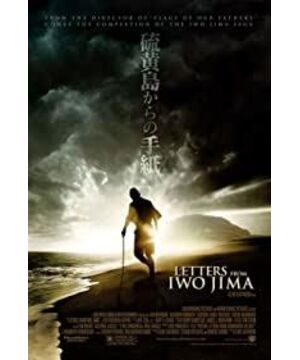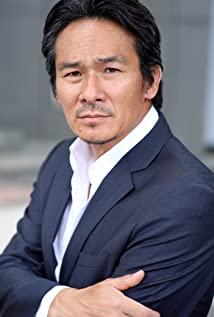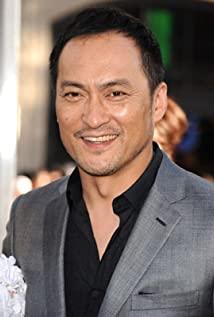Before watching this movie, I was very curious how the Japanese would tell this story and what kind of battle would be presented to the Japanese people and the American people. There is a bit of a contradiction in how the Americans, who were once the enemy, then the occupier, and then the leader-type ally, told the battle, and how the Japanese people presented the image of the soldiers at that time. However, the film is handled well, and the "flattering" of the United States is just right, showing the strength and friendliness of the United States. Let's talk about the strength first. In the film, there is a sigh of the commander who just arrived in the United States, and the commander tells the officers how many cars the United States produces each year. There is also a magnificent panorama of the American fleet; when it comes to friendship, the general’s farewell party in the United States before returning to Japan, the exchange between the equestrian champion and his American counterparts, and the final attitude of the US military towards the hero are all shown. Although the US military shoots prisoners of war, the film The Chinese and American squads took the prisoners and said they wanted to feed them. Details such as the eyes of another American when they shot and killed all seemed to show that it was the individual behavior of an American. On the Japanese side, in general, the movie shows a group of loyal, fanatical, unafraid of death, and absolutely obedient Japanese troops. The Japanese soldiers in the film were afraid but did not disobey after receiving the order, and several officers charged in disobedience in order to be loyal to the emperor. There are only three Japanese soldiers who surrendered in the film, two supporting roles, and the other, Shimizu, who was scared after the suicide order was issued, but chased and stopped when he saw someone running away. In addition, he also showed his kindness in his memories. The protagonist wants to surrender, but at the end of the film, he is still waving a shovel instead of kneeling and begging for mercy. There are scenes of shouting long live the emperor many times in the film, which reflects the fanatical worship and absolute obedience to the emperor at that time. This worship was greatly weakened during the occupation of Japan by the US military, but I believe that many people in Japan are still deeply in their hearts. Have a great impact. The overall portrait of Japanese soldiers created by the film is believed to be less introspective and hated by Japanese audiences, and more of sympathy and even reverence, but the film does not behave like "Men's Yamato". But in our opinion, there must be something to hate about poor people. The film sets the scene at the last resistance of the Japanese army on its own territory in the late World War II, so it fails to show the crimes committed by the Japanese army when they invaded other countries. There is a loss of comprehensiveness and a sense of introspection. But in general, this film can still be regarded as an anti-war theme. The deception of the people on the island and the country by the Japanese military headquarters, the forcible conscription of goods and men, and the use of military police to monitor closely are all shown in the film. At the same time, the film describes the war from the perspective of personal humanity, and the performance of the characters' hearts is also more delicate. The film uses contrasts in many places, and the display of the American family letters contrasts with the Japanese family letters.
I am deeply impressed by some of the details in this film, such as the feeling that the Japanese are real, and the wife was pregnant and asked her to sweep the floor and read a book in the posture of Guan Gong. There are also many reactions to Japanese suicide culture in the film. Japanese soldiers think suicide is honorable and loyal. The film also mentions the Yasukuni Shrine several times, which makes me think of Japan's kamikaze and torpedoes that are manipulated. There are also many ways to commit suicide in the film. Knives, guns and grenades are used. The guns include temples, foreheads, chests, etc. It is said that when German officers committed suicide, many of them shot their pistols at the cerebellum. . The most classic caesarean section did not appear, but the hand grenade covering the chest was only seen in online articles before. It was the first time to see it visually. It is said that Chinese soldiers also had a saying of "Guan Rongdan" in resisting US aggression and aiding Korea. In addition, I have doubts about two details. First, it is said that the Japanese army received a suicide order during World War II, and grass-roots officers would supervise the soldiers to commit suicide and kill those who dare not, and finally commit suicide. In the film, the team leader committed suicide early, making the two soldiers to run away. Instead, it is said that when Saipan and Iwo Jima failed, a large number of Japanese troops, civilians and military members committed suicide by jumping off the cliff, and the film shows that the civilians were transferred to the island early.
There are differences between Eastern and Western cultures, and this difference is also reflected in military thinking. Western countries such as the United States allow soldiers to surrender if necessary, while in the East, whether it is China or Japan, surrender is a disgrace. It is said that during the conflict between China and the Soviet Union on Zhenbao Island, both China and the Soviet Union made a propaganda film. The Chinese side shot the soldiers without fear, and the army and the people were united, while the Soviet side shot the funeral of the sacrificed soldiers and the tears of their relatives. As a result, the Soviet side got the more sympathy and support from Western countries. In addition, there is a comparison, the performance of the soldiers of the United States, Japan and China when there is only one bullet left. American soldiers surrendered, Japanese soldiers committed suicide by shouting long live the emperor, and Chinese soldiers killed one enemy, seized his gun, then wiped out several enemies and finally died gloriously, just like the five heroes of Langya Mountain. China is different from the West in filming war movies. China promotes the main theme, and the perspective is high-level, showing the courage, courage and optimism of officers and soldiers, while the Western war chapters are more down-to-earth On the other hand, the war is presented from a personal and human perspective, and the scenes are more realistic and cruel. They also reflect tunnel operations. "Shangganling" and "Letter from Iwo Jima" are completely different styles. Some people don't like this style of China, but I actually think it's pretty good. There is no shortage of good war themes in China, but in order to win international awards and cater to foreign tastes, today's big directors either show China's social problems or backwardness, or engage in martial arts and gorgeousness. Film companies are all looking for money. In this context, there is little interest in the war blockbusters previously invested by the state. Of course, high-investment war movies are also quite risky in business. I don't want to see war, but I want to see good war movies.
"Letter from Iwo Jima" is well shot and the music is also very good, worthy of the Golden Globe Award for Best Foreign Language Film and the Oscar for Best Score. It may even move the audience in China, but I would say that only by reflecting on one's own mistakes can we avoid repeating mistakes. I believe that people of all countries do not want to see the disaster brought about by the war.
View more about Letters from Iwo Jima reviews











